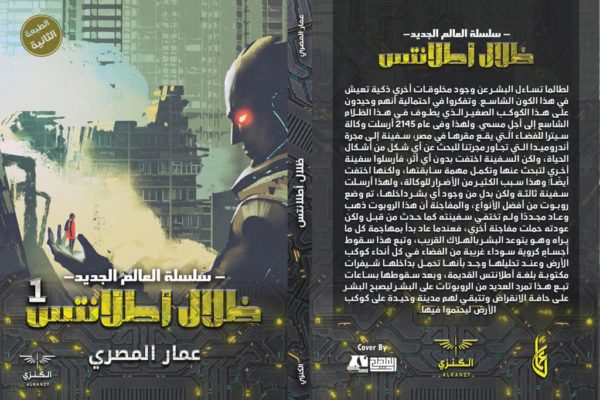by EMAD EL-DIN AYSHA

She says: when are we gonna meet?
I say: after a year and a war
She says: when does the war end?
I say: the time we meet—Mahmoud Darwish
They made it plain to everyone, however, and above all to the king himself, that although he had plenty of troops, he did not have many men.
—Herodotus
I would happily claim to be the first in the folds of Arabic science fiction to write Palestinian resistance literature (adab al-muqawama, ??? ???????), but, alas, the Egyptians beat me to it. Muhammad Naguib Matter, for example, who was an engineer by vocation and a science-fiction writer by passion, penned “A Weapon Fashioned of Waste” long before I even began to write.1 (The story begins with Palestinian resistance fighters learning to trick the pheromone-sniffing Israeli missiles by using urine trails, after which the Palestinians devise their own phosphorous bombs, also extracted from urine.)2 Ahmed Khaled Tawfik’s Jonathan’s Promise (2015) and The Last Dreamer (2009) also stand in the resistance genre. (The first text is about an upside-down world where Arabs live in the diaspora and the United States decides to give them a homeland of their own. The second is a fantasy series in which Che Guevara is resurrected from the grave, cloned by Chinese geneticists, and sent to Iraq to give the United States some hell. He later makes it to occupied Palestine to do the same but is apprehended and killed by the Israelis.)
One of the earliest works of Arabic science fiction, the 1962 Algerian novel Qui Se Souvient De La Mer (Who Remembers the Sea) by Mohammad Dib, was also part of the resistance-literature genre and was written in the heyday of the struggle for national independence.3 (Instead of speaking explicitly about the French occupation, Dib has alien robots ransack his homeland up against a few bands of brave men armed with handguns. Nonetheless, the human protagonists win in the end.) Sadly, since Qui Se Souvient De La Mer, nothing was written in the resistance or military science-fiction genres, in Algeria or elsewhere, until 2001 when Hosam El-Zembely published the dystopian novella America 2030. (In it, the United States degenerates politically and ignites a nuclear war as a team of operatives tries desperately to destroy a secret weapon, tipping the balance of terror.4 And this was written before September 11—only for Egyptian and most Arabic science fiction to quietly forget the very real attacks against Arabs and Muslims since then.)
It is almost a truism now that the history of Arabic science-fiction writing is characterized by fits and starts.5 Tragically and inexplicably, the same seems to hold true of Arabic resistance literature. I get this from the horse’s mouth, so to speak, having spoken with the resident expert on resistance literature, Egyptian author Al-Sayyid Nejm.6 Almost from his first uttered word, he explained that the category itself is new to Arabic literature, insisting that Palestinian author Ghassan Kanafani was the one who coined the term. Previously, it only existed in residual form, under the labels adab al-hamasa (??? ???????) and al-harakat (???????)—the literature of agitation and of movements.7 The same goes for war literature, he added, on which he is also an expert. What is more, neither resistance nor war literature are parts of higher education, at least in Egypt.
There are no specialized courses in either resistance or war literature in Egypt. Books and stories and poetry on the topic are taught, but in generic courses about classical and contemporary Arabic literature, the contemporary Arabic novel, Arabic literature in translation, and so on. Even the 1973 October War, one of our few victories, has not received the literary and critical attention it deserves. This has prompted critics to describe the genre of war stories as almost a foreign entity that has entered our midst undetected.8 How could this be, when almost the whole Arab world struggled for its independence against foreign colonizers? When a frontline nation like Egypt fought so many wars and not just against Israel? After all, the 1956 Suez War was over the nationalization of the canal, primarily in the face of the British and French empires. If you go to an Egyptian bookstore, you will find the same telltale pattern of malign neglect. It will be hard to find anything written by Egyptians on the topic, whether fiction or nonfiction. I say this having just attended the fiftieth Cairo International Book Fair. I did not find anything of Nejm’s there either, except at one solitary (non-Egyptian) bookshop that had an overly expensive book about him.
Monthly Review Online for more
